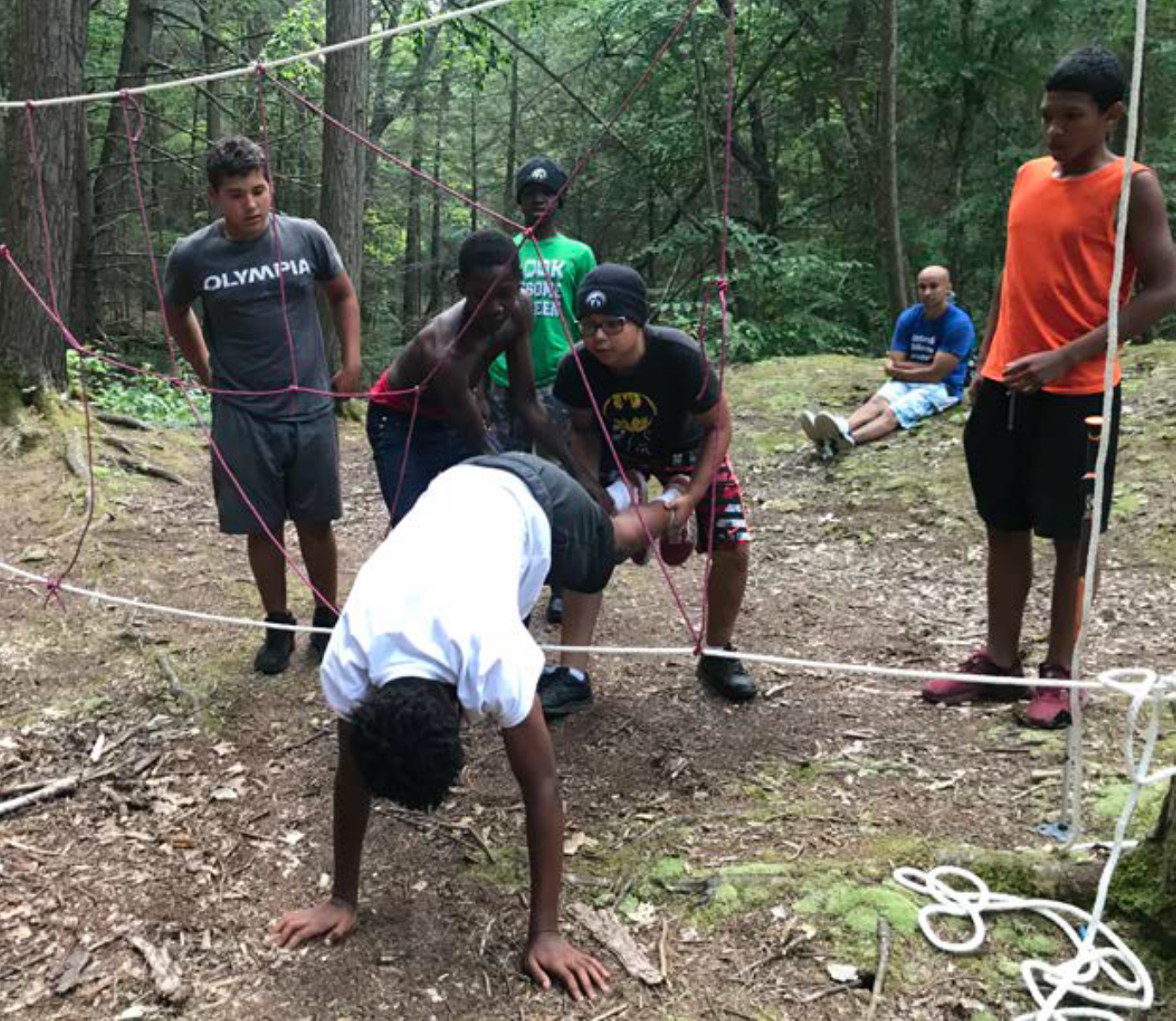By Scott Wager, Co-Founder, director, President/CEO
This expedition, sponsored by the Newark Central School District, was the first tier of a three year continuum of experiential social-emotional development programming. The continuum, aimed at improving life outcomes, also provides a mentorship pathway for six boys in the district’s My Brother’s Keeper (MBK) program who are currently transitioning from 7th to 8th grade.
Activity sequencing for this cohort’s expedition was designed to continually strengthen personal relationships, increase individual and group trust, and develop the supportive communication patterns necessary for collaborative problem solving. Self-awareness, self-management, and self-efficacy were the overarching emotional intelligence pursuits targeted throughout every activity that directly support improving life outcomes.
Monday
The expedition began with a day full of activities intended to break down inhibitions, establish a set of guiding principals (group norms) for the week, and initiate 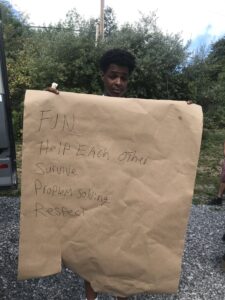 conversations about integrity and trust. A scavenger hunt for bags full of food (intended to be communal snacks for the week) showed a tendency towards selfserving individuality, personal recognition and instant gratification over consequential thinking and group equity.
conversations about integrity and trust. A scavenger hunt for bags full of food (intended to be communal snacks for the week) showed a tendency towards selfserving individuality, personal recognition and instant gratification over consequential thinking and group equity.
After setting up the common camp area and everyone’s individual tents we ventured out to explore the grounds of Ontario County Park in South Bristol, NY. Throughout the afternoon hike, a variety of tag based activities provided opportunities to expend anxious energy and discuss the importance of integrity.
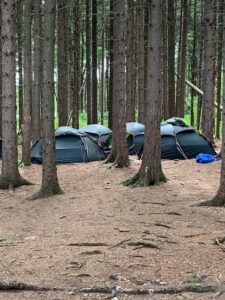 Following a classic summer camping dinner of grilled cheeseburgers and corn on the cob, we asked the boys to spend some time alone reflecting on what they had discovered about themselves or the group throughout the day, and what their individual goals were for the week. During the evening’s debrief session, Aamod and Shamar stated they didn’t learn anything and each had the same goal which was surviving the week; Carlos’ goal was to have fun and he learned how to cut down a dead tree with a hatchet for firewood; Lindsey and Levar also stated that they didn’t learn anything and had respective goals of developing teamwork skills and gaining a sense of responsibility. Jamari provided the most impactful and controversial feedback, sharing that he discovered three of the group members were quitters because the just quit or refused to engage in activities that they didn’t like or made them uncomfortable. The three accused of being quitters immediately attempted to refute his statement, but his accurate and concise description of how they quit during an activity called “Evil-Eye” deflated their rebuttals. Jamari then shared that he had been sad for several days, and was hoping to have a spiritual awakening during the expedition.
Following a classic summer camping dinner of grilled cheeseburgers and corn on the cob, we asked the boys to spend some time alone reflecting on what they had discovered about themselves or the group throughout the day, and what their individual goals were for the week. During the evening’s debrief session, Aamod and Shamar stated they didn’t learn anything and each had the same goal which was surviving the week; Carlos’ goal was to have fun and he learned how to cut down a dead tree with a hatchet for firewood; Lindsey and Levar also stated that they didn’t learn anything and had respective goals of developing teamwork skills and gaining a sense of responsibility. Jamari provided the most impactful and controversial feedback, sharing that he discovered three of the group members were quitters because the just quit or refused to engage in activities that they didn’t like or made them uncomfortable. The three accused of being quitters immediately attempted to refute his statement, but his accurate and concise description of how they quit during an activity called “Evil-Eye” deflated their rebuttals. Jamari then shared that he had been sad for several days, and was hoping to have a spiritual awakening during the expedition.
Tuesday
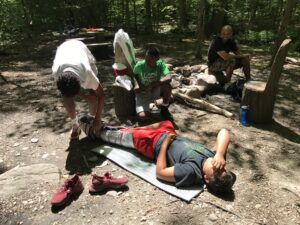 Day two of the expedition was focused on building individual and group trust. A series of first aid based activities that lead up to building a rescue litter and carrying each other through the woods along with some blindfolded trust walk activities were planned.
Day two of the expedition was focused on building individual and group trust. A series of first aid based activities that lead up to building a rescue litter and carrying each other through the woods along with some blindfolded trust walk activities were planned.
Frequently on expeditions (and life in general) things do not go exactly as planned, and this day was no exception. We started at 8:00 am with a hearty breakfast of oatmeal and eggs. By 9:30 the campsite had been cleaned, individual backpacks loaded, and I had facilitated a formal discussion about trust using a z-pulley system loaded with a heavy backpack as a metaphor for how trust is incrementally built or lost with every action. The height of the backpack represented the level of trust built, pulling the rope to raise the backpack represented the effort it takes to build trust, and a releasable progress capture device represented behaviors that lose trust. Small trespasses on trust dropped the level slightly, while large infractions sent the backpack to the ground, pulling several feet of extra rope through the system. The group quickly identified that it takes much more work to rebuild trust once it bottoms out.
Jesse Cruz, a Youth Advocate Program (YAP) employee who works closely with the boys throughout the school year was scheduled to join us for the day’s activities at 10:30. As a reward for their morning teamwork and efficiency, I let the boys play basketball until Jesse arrived. While they played, I laid out a loaf of bread, jars of peanut butter and jelly, a bag of apples, and two boxes of snacks. When the boys returned, I told them this was their food for the afternoon, and gave them 15 minutes to either make individual sandwiches and snack packs, or to load the bulk goods into their backpacks so we could make lunch on the trail. Some perceived there to be an abundance of food and ate sandwiches as others debated the merits of dividing food up now, or carrying it all for later. Seeing half of the bread now gone, the group quickly fell into a self-
serving mindset. Each person made as thick a peanut butter and jelly sandwich as they could before someone yelled at them for hogging the food and forced them to give up the jar. Out of time, and sandwiches, one person grabbed the bag of apples, another grabbed the remaining snacks and we started to hike. Within 10 minutes of hiking, the three boys in the faster hiking group ate all of the apples, fully aware that the group of six now had only eight snack pouches for the remaining 6 hours of hiking.
90 minutes later, after a steep downhill hike we arrived at the beaver pond lean-to. 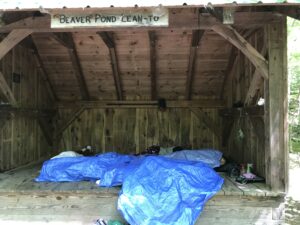 Tired from the combination of a strenuous hike and a restless nights sleep, everyone except Carlos sprawled across the lean-to floor, covered themselves with tarps and promptly fell asleep. following their nap, it was difficult to get the group engaged making the foundational activity of leg splinting less impactful and longer in duration than planned. Knowing that the team was losing energy, mental acuity, and patience due to their choice in food rationing, I abandoned the blindfolded activities and used a game of tug of war to create enough engagement and fun to carry through the final problem solving and trust building activity.
Tired from the combination of a strenuous hike and a restless nights sleep, everyone except Carlos sprawled across the lean-to floor, covered themselves with tarps and promptly fell asleep. following their nap, it was difficult to get the group engaged making the foundational activity of leg splinting less impactful and longer in duration than planned. Knowing that the team was losing energy, mental acuity, and patience due to their choice in food rationing, I abandoned the blindfolded activities and used a game of tug of war to create enough engagement and fun to carry through the final problem solving and trust building activity.
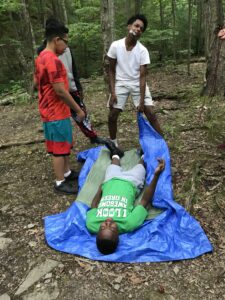 The team was given the scenario that one member had broken both legs in a fall, and had to be carried out to an ambulance. Their task was to build a litter and transport the team member through the woods to the awaiting ambulance. They were creative in their solution and worked well together to wrap their “patient” in a tarp, secure it with rope, and carry him 50 yards through the woods. A second attempt at the problem showed that most of the group was exhibiting what I refer to as “hanger” (irritability due to a lack of blood sugar). so we ended the activity and prepared four our return hike.
The team was given the scenario that one member had broken both legs in a fall, and had to be carried out to an ambulance. Their task was to build a litter and transport the team member through the woods to the awaiting ambulance. They were creative in their solution and worked well together to wrap their “patient” in a tarp, secure it with rope, and carry him 50 yards through the woods. A second attempt at the problem showed that most of the group was exhibiting what I refer to as “hanger” (irritability due to a lack of blood sugar). so we ended the activity and prepared four our return hike.
The 3 mile hike back up the same steep trail they descended earlier in the day proved challenging for everyone. Their morning food binge leaving them sluggish and clumsy, the team tripped over small rocks and roots as they shuffled their feet along the trail. By 5:30 pm everybody had made it back to the campsite and were asked to spend some some time alone reflecting on what they had discovered during the day, and how the team upheld their established norms. Lindsey fell asleep during his reflection and did not awaken until 2:30 am Wednesday morning. Jamari said, “I liked learning how to splint a leg and am happy that I got pretty good at it.” He also pointed out a violation of their group norms stating, “We were disrespectful by arguing with each other and also not doing what you asked after napping in the lean-to.” Shamar shared his opinion that the team worked well together and said “I liked the hike and was glad I was leading the group both on the way down and back up.” Carlos said “I just had fun doing everything and want to come on more trips.”, (which I must admit made me feel good). Levar supported Jamari’s view of the infraction on norms and said to the group “We gotta stop disrespecting each other and arguing. It makes it not fun.” Levar also shared that he made progress in developing a sense or responsibility by keeping track of all his gear, and always knowing what he was supposed to be doing. Aamod did not comment on group norms, sharing only that he should have brought his anxiety medicine.
As we ate s’mores and talked around the campfire, Aamod shared some details of how his anxiety manifests and told the group that because he was not sleeping at night he didn’t think he could make it through the trip. After hearing Aamod, Shamar said he needed to home to his phone, and Levar said he was homesick and also wanted to leave on Wednesday. Feeling their desire to leave was part exhaustion, part fear of the unknown, and part avoidance of hard work, I knew that it was going to take someone with a close personal relationship to change their minds, so I arranged for them to discuss their requests with James Schuler (YAP’s leader of MBK) in the morning.
Tuesday night was difficult for everyone on the team except Carlos (who the team described as someone who sleeps and snores like a hibernating bear). Lindsey and Jamari had both gone to bed early and awoken around 2:30 am. Aamod, Levar and Shamar had not yet fallen asleep and shortly after Jamari and Lindsey woke up, the campsite erupted with profanity and trash-talking banter. In an effort to be warmer, Levar, Aamod, and Lindsey piled into Jamari’s tent while Shamar remained in his tent trying to fall asleep. by 3:00 am the banter had turned into a 4 on 1 roasting of Shamar, led by Jamari. The effect of my prompts for them to either be nice or be silent were short lived, and the by 4:00 Shamar had burst out of his tent calling Jamari out for a fight. Frustrated, and utterly disgusted by what I had heard in that hour, I roared that everyone was to get out of their tents and assemble at the campfire pit immediately; Not a word was to be uttered until I asked them to speak! For the next 90 minutes we sat in the dark discussing trust, integrity, and conflict resolution strategies. As the sun began to rise, the group had worked through a long standing conflict that was fueled by a perception that Shamar could dish out banter, but not take it. Through facilitated discussion they came to realize that the core of the issue was their inability to recognize when they started crossing boundaries of emotional safety and when they had entered into the lose-lose behavior of one-upping each others trash talk.
Wednesday
After an early breakfast of eggs and sausage, the group asked me if they could play basketball while we waited for volunteers to show up for the days mountain biking activities. My response was an immediate “No, that is where much of your banter starts, and you lost my trust in your ability to manage behavior.“ I didn’t really want to take basketball away from them, but I felt there needed to be consequences for their actions, and wanted to fill the time with something more aligned with socialemotional development. Blindfolded basketball is what I came up with. I presented the idea: You 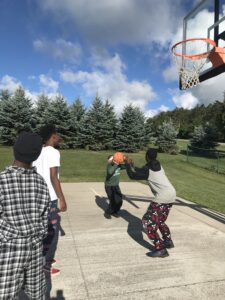 can play ball, but by my rules. The shooter is blindfolded, and his partner has to verbally guide him through stationary defenders to make the shot. Lindsey, Shamar, and Aamod, said the idea was stupid and impossible. Carlos on the other hand, saw this as an opportunity and told the group “hey, he is giving us an opportunity to play and win back our privilege, so lets go!” Jamari was in, but the other four were more interested in complaining about not getting their way, so I walked off leaving them to complain amongst themselves.
can play ball, but by my rules. The shooter is blindfolded, and his partner has to verbally guide him through stationary defenders to make the shot. Lindsey, Shamar, and Aamod, said the idea was stupid and impossible. Carlos on the other hand, saw this as an opportunity and told the group “hey, he is giving us an opportunity to play and win back our privilege, so lets go!” Jamari was in, but the other four were more interested in complaining about not getting their way, so I walked off leaving them to complain amongst themselves.
A few minutes later I walked through camp with a blindfold in one hand, basketball in the other, and said to Carlos and Jamari, “Lets go, who’s first?” as I continued towards the basketball court. Everyone immediately followed. On the court, the group thought there should be some more rules to guide play, and decided on 5 attempts per shooter, shooter’s partner does burpees if the ball gets stolen by a defender. Shamar, defiant of those rules said he wouldn’t do any stupid exercises, and was going to make his own rules. That choice landed him on the bench as everyone else engaged in what turned out to be a fun and valuable activity. In debriefing the activity Lindsey said “I learned you have to be really specific or they go the wrong way.” In a follow up conversation with Shamar, he said he didn’t want to to exercises because his legs were tired from the day before. This presented a great teachable moment to reinforce elements of our 4:00 am discussion; Your tone will be mirrored back to you, and if you are not specific about what you want, others can not give it to you, which puts you in a losing situation.
By 10:00 am James Schuler had contacted the families of the three boys who wanted to go home, and conveyed that their families wanted them to stay and complete the expedition. I informed the boys that James would be coming out in the late afternoon, and we were going to move forward with the days mountain biking activities as originally planned. Within an hour of that statement all of the prior animosity had been left behind and everyone was fully present, living in the moment; filling the woods with sounds of laughter, joyous screams, and encouragement. They even drew the attention of a six-point buck who curiously observed as the boisterous group rode past him with laser like focus on the trail ahead of them.
 After a few hours of riding through grassy fields and on gravel paths, the group was eager to get some lunch and try out some single track (one bike wide) trails. Energized by Nutella sandwiches, fruit, and someones secret stash of Gushers, they were ready to test their skills on intermediate level trails. As they further built confidence on relatively flat, but narrow and winding trails we gradually worked our way to the southern section of the park where they could experience some mildly technical climbs and descents. Near the end of the ride Shamar made the common mistake of applying too much front brake while descending, causing his front tire to slide out and crash. Once we confirmed that his ego was the only thing hurt, we all cheered and applauded as Mike Davis, (a volunteer supporting us as well as Conkey Cruisers in Rochester) declared that Shamar’s crash was the completion of a mountain biker’s rite of passage, and he was now officially a mountain biker.
After a few hours of riding through grassy fields and on gravel paths, the group was eager to get some lunch and try out some single track (one bike wide) trails. Energized by Nutella sandwiches, fruit, and someones secret stash of Gushers, they were ready to test their skills on intermediate level trails. As they further built confidence on relatively flat, but narrow and winding trails we gradually worked our way to the southern section of the park where they could experience some mildly technical climbs and descents. Near the end of the ride Shamar made the common mistake of applying too much front brake while descending, causing his front tire to slide out and crash. Once we confirmed that his ego was the only thing hurt, we all cheered and applauded as Mike Davis, (a volunteer supporting us as well as Conkey Cruisers in Rochester) declared that Shamar’s crash was the completion of a mountain biker’s rite of passage, and he was now officially a mountain biker.
Shortly after the ride, James arrived at the park. Having great respect for him, the boys were both excited to see James, and apprehensive about the lecture they “knew” he would give. More a motivational speech than a lecture, James talked to the group about the importance of persevering when faced with challenging times, setting today’s goal as making it through to tomorrow, and supporting our brothers, even if we don’t understand their decisions. Aamod, Shamar, and Levar agreed to say one more night and reevaluate on Thursday morning.
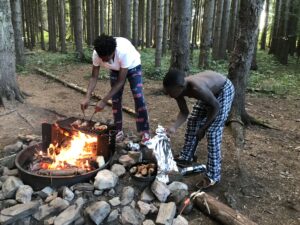 To prepare our nights feast of barbecued chicken and tossed salad, the team gathered wood and built a nice fire to cook over. Jamari and Levar worked together to cook 1/2 the chicken over the fire, while Shamar and Aamod worked together to cook the rest on the small gas grill.
To prepare our nights feast of barbecued chicken and tossed salad, the team gathered wood and built a nice fire to cook over. Jamari and Levar worked together to cook 1/2 the chicken over the fire, while Shamar and Aamod worked together to cook the rest on the small gas grill.
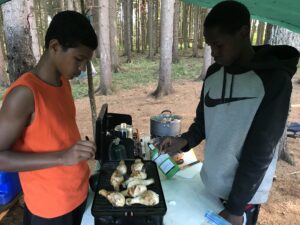 As the four cooked chicken, Lindsey continued to cut firewood and Carlos rallied for an after dinner ride from the campsite to our gear barn – nearly 6 miles away. Much to my surprise the entire team agreed with Carlos’ plan so as dusk approached we launched the final ride of the day.
As the four cooked chicken, Lindsey continued to cut firewood and Carlos rallied for an after dinner ride from the campsite to our gear barn – nearly 6 miles away. Much to my surprise the entire team agreed with Carlos’ plan so as dusk approached we launched the final ride of the day.
Danielle led the way in the van, monitoring intersections and capturing photos while I rode behind to make sure everyone was safe and accounted for. Although she missed the photo opportunity, Danielle shared that as the boys arrived at the barn, they jumped off their bikes, high-fiving and hugging each other in celebration of a great ride!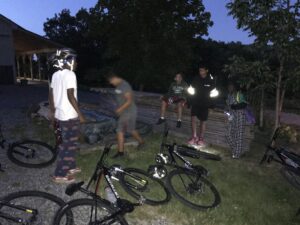 Tonight everybody went to bed by 10:00 pm and slept through the night!
Tonight everybody went to bed by 10:00 pm and slept through the night!
Thursday
Thursday, the fourth of the five day expedition was structured as a day of problem solving and adventure in the beautiful landscape of High-Tor’s Conklin Gulley. In the morning, Aamod and Shamar still wanted to go home and were hopeful that they could leave as soon as Jesse Cruz arrived. But today was intended to be the apex of the social-emotional development work, where self-awareness and self-management merge to create a sense of self-efficacy. So, before Jesse showed up I told the boys that they would go through the days activities and could leave with him at the end of the day if they still wanted to. My hope was that they would stick it out for one more night and complete the expedition.
After a breakfast of scrambled eggs and bagels, the team filled their backpacks with harnesses, helmets, sleeping mats, and a variety of ropes and gear for the day’s adventures. To test their learning from Tuesday’s experience, I again laid out a loaf of bread, jars of peanut butter, jelly, Nutella, fruit, and other snacks, and gave them 15 minutes to pack their lunch. This time, they inventoried the snacks to make sure everyone had the same amount and packed all the food into their backpacks for a trailside lunch.
The hike into High-Tor was short compared to the weeks prior activities and we quickly reached a plateau above the gulley’s two main waterfalls. The team sat together on the plateau admiring the beauty of the gulley landscape as I set up their first activity – The spider web
.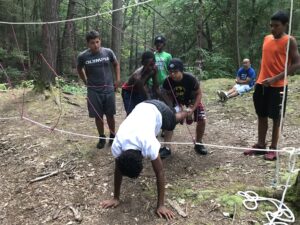 A communication centric problem solving activity, the objective is to get everyone from one side of the web through to the other side without touching the web. The challenge was met with enthusiasm, and in just a few attempts they succeeded in passing everyone from one side to the other, without much strategy. As I increased the difficulty, the team continued to work well together. Demonstrating strong problem solving skills they overcame their lack of strategy and generally poor communications to complete the task.
A communication centric problem solving activity, the objective is to get everyone from one side of the web through to the other side without touching the web. The challenge was met with enthusiasm, and in just a few attempts they succeeded in passing everyone from one side to the other, without much strategy. As I increased the difficulty, the team continued to work well together. Demonstrating strong problem solving skills they overcame their lack of strategy and generally poor communications to complete the task.
Finally, it was their desire complete the challenge in under 2 minutes that brought focus to the core lessons of the activity. Competitive by nature, they worked hard to go faster, but in their haste, multiple people were giving direction at the same time, leaving some teammates unclear on what to do. As a result they repeatedly got caught in the web. Spotlighting this problem by putting Jamari and Levar on the spot to explain the strategy and their roles allowed the team to recognize and fix the communication problem. In the next round, Aamod laid out a strategy while everyone else listened and only asked clarifying questions. Impressed with their progress I anticipated their success, but they still were so focused on going fast that they got caught in the web. I shared a story of how my military and wilderness medicine training always centered around the phrase, “slow is smooth, smooth is fast.” A few seconds later, Carlos said “if we slow down we won’t make mistakes and will get through clean”. Their very next attempt succeed in 50 seconds!
As I set up for the next activity, rappelling, the team prepared their lunch. For the first time on the trip the the entire group refrained from self-serving behavior and methodically made sure sandwiches were made equitably for everyone. They even served Jesse and I before themselves! To further evidence their shift in mindset, Jamari and Aamod sacrificed their snacks to allow Carlos and Lever (who were vocal about still being hungry) to eat a little more.
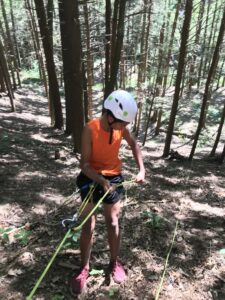 To prepare for the day’s apex problem solving activity of getting an injured team member across “The gulley of anger & rage” the team practiced rappelling on a 40o incline bank, approximately 100 feet long. The team, genuinely interested in mastering this skill, took their time practicing the tie-in process and rappelling down the bank. Aamod, who originally was not going to participate due to his fear of heights, decided to face his fear, trust the system and work through the challenge. After tying himself into the system, he made a slow, methodical descent with me by his side encouraging him, and rest of the team encouraging him from below. This was now the second day that the team had set aside their personal grievances and were actively supporting each other to overcome personal challenges!
To prepare for the day’s apex problem solving activity of getting an injured team member across “The gulley of anger & rage” the team practiced rappelling on a 40o incline bank, approximately 100 feet long. The team, genuinely interested in mastering this skill, took their time practicing the tie-in process and rappelling down the bank. Aamod, who originally was not going to participate due to his fear of heights, decided to face his fear, trust the system and work through the challenge. After tying himself into the system, he made a slow, methodical descent with me by his side encouraging him, and rest of the team encouraging him from below. This was now the second day that the team had set aside their personal grievances and were actively supporting each other to overcome personal challenges!
After rappelling the team looked a bit worn out, so I asked how they were feeling. Without hesitation Jamari said “honestly, I’m physically and mentally spent.” I thanked him for being honest, and asked the group what they would like to do for the last hour in place of the “gulley of anger & rage.” They decided for a short hike up Conklin Gulley to show Jesse the waterfall they had rappelled into last summer.
At the waterfall, Aamod and Shamar confirmed that they still wanted Jesse to take them home so we headed back to pack up their gear and send them off.
Later that evening I learned that as Lindsey and I were lagging behind talking on the return hike, Levar had successfully intervened to stop the group from harassing Shamar about his decision to leave with just one more night to complete the expedition. Levar had reminding the group of James’ speech about supporting each other, and the harassment stopped.
As Shamar and Aamod were packing up their tents and gear, the remaining four boys 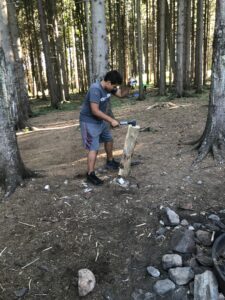 set out to collect and cut enough firewood for an “all nighter.” For the first time on the trip, they discussed what needed to be done, created a team based system to accomplish the work, and used some creative problem solving to make the work easier, without any prompting or guidance from me.
set out to collect and cut enough firewood for an “all nighter.” For the first time on the trip, they discussed what needed to be done, created a team based system to accomplish the work, and used some creative problem solving to make the work easier, without any prompting or guidance from me.
With the fire started, camp cleaned up, and a few hours of daylight left, the boys asked if they could play some two on two basketball before having dinner. Jamari, normally composed and smooth on the court, grew increasingly frustrated as he fumbled the ball and missed what were typically easy shots for him. To me, knowing that he had neither eaten or drank much throughout the day, it was obvious that he suffering from dehydration and low blood sugar. He however, had not yet learned of the relationship between food, water and coordination. After gorging on hotdogs, macaroni & cheese, and s’mores, the fatigue from a physically and mentally strenuous week set in, and the boys retired for the night.
Friday
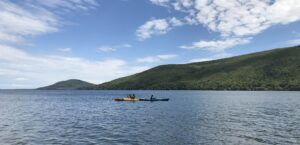
Friday, a day kayaking on the southern end of Canandaigua Lake was the perfect way do decompress from the rigors of the week and reflect on the personal and group growth that had occurred. The four remaining boys had been looking forward to kayaking all week, and were anxious to get on the water as early as possible. So, after a delicious breakfast of pancakes and maple sausage, they quickly cleaned up camp, inventoried all of their gear, packed everything up and loaded it into the van – again all without any prompting from me.
We arrived at the Woodville boat launch at 10:30, and by 11:00 everyone had been fitted in their kayaks and were in the water silently paddling north. At first, Lindsey was struggling to keep the kayak from turning in circles, so I stayed back with him as the others, along with our volunteer lifeguard Jeff Garrett paddled ahead. As I coached Lindsey on paddling technique he saw the team was quite a ways ahead and began trying to paddle harder and faster in an effort to catch up. As he now went in circles even faster, his frustration grew and he was heading into a temper tantrum. I paddled up next to him, and explained that the madder he got, the worse the situation would become. I reminded him of our conversation about the physiological element of emotions lasting only six seconds, and the remainder was largely a conscious choice. A few seconds later I suggested that this was the time for choosing to calm his mind and trust his body to make the right motions. Within minutes he was heading due north towards the others who had rafted-up and were waiting for us to join them.
We paddled onward, about five miles from our launching point to a cove on the western shore. There we ate, swam, skipped rocks across the water and watched a mink patrol the shoreline. Warmed by the sun, and calmed by the water, the group chose to paddle into the center of the lake and float around taking in the simple beauty of the encompassing wooded hills.
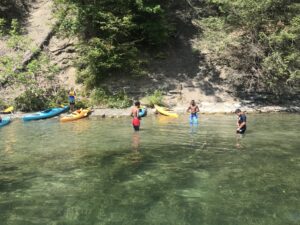
As the expedition came to a close and the four remaining members of the team were polishing off a pizza before unloading the van, we conducted a final reflection and debrief session where I asked the following questions:
1) What did you discover about yourself during the expedition?
- Jamari: “ I discovered that I have to eat well and stay hydrated to play good ball. Looking back this has hurt my game before.”
- Carlos: “I discovered new skills for going fast on a bike, like shifting my weight back off the seat.”
- Lindsey: “I learned how to listen more and that people can take what I say wrong.”
- Levar: “I discovered that even though I was kind of afraid of the dark, their is nothing to be scared of on the trip.”
2) If you could give one piece of advice to future expedition kids, what would it be and why?
- Levar: “Don’t be scared and always be supportive of each other.”
- Lindsey: “your not going to get much sleep, so drink some of Scott’s tea at night – it will help you sleep.”
- Jamari: “Bring only what you actually need, not all the stuff you think you want.”
- Carlos: “enjoy everyday to the fullest because you never know when you might die for some reason.”
3) What was the most important or valuable part of this trip for you, and why?
- Jamari: “When we got in trouble Tuesday night because we got to talk and figure things out so we argued less.”
- Lindsey: “Same as Jamari.”
- Levar: “Integrity, because so many people at school say they will do stuff and then don’t.”
- Carlos: “All of it. Just being out in nature learning and experiencing things.”
4) Would you be interested in participating in future Expedition trips? If so, what would you hope to gain from the experience?
- Carlos; “Oh Yea! I’ll come on every trip.” “I hope to go fishing.”
- Jamari: “Yes, the trips are cool.” “I would hope to have fun.”
- Lindsey: “Yes, it’s hard but I would want to gain more skills at teamwork and working together better.”
- Levar: “Yes, and like Jamari, mostly to have fun with the group without arguing.”
Although not everyone was able to complete the expedition, each team member persevered through personal challenge, constructively worked through difficult conflicts, and made noticeable gains in self-awareness and self-management skills. I am proud of them for the effort they put forth, and look forward to fostering further grown through future expeditions.

